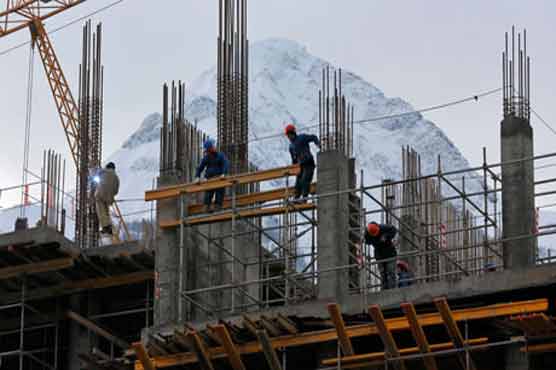Migrant workers at Sochi Olympic sites face abuses

Migrants from Central Asia are doing the grunt work that Russians find too low-paid and demanding.
SOCHI: One year ahead of the Winter Olympics in Sochi, the roads in the Black Sea resort and its surrounding mountains are lined with migrants from Central Asia doing the grunt work that Russians find too low-paid and physically demanding.
Tens of thousands of migrant workers from Uzbekistan, Tajikistan and Kyrgyzstan are a key element in Russia s intense drive to build facilities for the 2014 Sochi Games. The event is viewed as the country s biggest construction project and a matter of national pride for President Vladimir Putin, in particular.
But many migrants, whose pay typically provides for their entire families back home, complain that Russian contractors are cheating them and withholding their wages. Most of the foreign laborers speak poor Russian and many are afraid to assert their rights.
Human Rights Watch on Wednesday released a report drawing a vivid picture of the routine abuse faced by Sochi migrant workers: underpayment, withheld wages and the absence of employment contracts. The report came out a day before Putin and Olympic officials mark the one-year countdown to the games with a spectacular ice show.
For Eshkobil Ashurov of Tajikistan, working in Sochi has been a boon and a bane. The 27-year-old steel-fitter has been able to send money home to his wife, children, parents and sisters in his impoverished homeland but that s only when his employers actually pay him.
In December, he said, he walked off his previous job after going 40 days without pay. He said 40 of the 100 men in his work group also weren t paid and most of them left Sochi.
Ashurov found another construction job in the mountain area where the outdoor Olympic competitions will be held, but it s still a difficult life. He typically works 10 hours a day, seven days a week and earns about 30,000 rubles ($1,000 a month). He sends 27,000 rubles of that home, leaving him little to live on besides his employer-provided accommodation and food.
"We re here to work," he said in an interview. "You get back, spend some time at home and go back here to work."
Ashurov s situation is common, according to Semyon Simonov, who runs a two-man advocacy group for migrants in Sochi that provides free legal help. But it s hard to tell how many workers truly are affected.
Federal Migration Service chief Konstantin Romodanovsky recently said that out of 74,000 people involved in construction in Sochi, only 16,000 are foreigners.
But the actual figure of foreign laborers in Sochi is likely much higher. According to Simonov, who contrasted official statistics on work permits with data on foreigners registered in the area, about 50,000 people may be working in Sochi without work permits.
Simonov and Human Rights Watch list the withholding of wages, the failure to provide employment contracts and excessive working hours as the most common rights violations that migrants in Sochi face.
In the HRW report, researcher Jane Buchanan said millions will be watching the 2014 Games unaware that "many migrants toiled in exploitative, abusive conditions to build these shimmering facades and luxurious interiors." The rights group called on the International Olympic Committee to set up a working group to monitor and prevent the mistreatment of workers.
Olympstroi, the Russian state company responsible for building the Olympic venues, said in a statement it has carried out more than 1,300 work inspections since 2011 but has identified only five cases of "wage irregularities."
The IOC reiterated its "long-standing commitment" to follow up cases of mistreatment or abuse and said it has been in contact with Human Rights Watch. In a statement, the IOC said it brought the issue of migrant workers to the attention of the Sochi organizing committee and had received information on the topic from Olympstroi.


